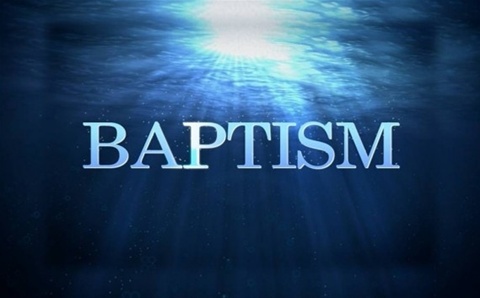There is a lot of confusion surrounding the topic of water baptism - Can it all be sorted out?
The subject of water baptism is a subject that has caused great divisiveness and confusion among Christians.
Some of the questions people ask about this subject are:
1. Is the practice of water baptism a practice that still pertains to the New Testament Church or was this a practice designed for believers under the Old Testament covenant?
2. If water baptism is still part of the New Testament
covenant, does it need to be done when a child is a baby or after a person has become a true believer or both?
3. If a person becomes water baptized, should the method of baptism be done by sprinkling, pouring, or even totally immersing
a person in the water?
4. If a person gets water baptized, what should be said during this occasion? Are we to baptize people in the name of Jesus as it says in the book of Acts, or are we to baptize in the name of the Father, the Son, and the Holy Spirit as Jesus said in Matthew 28:19?
5. Was Jesus even referring to baptizing people in water when He said these words in Matthew 28:19 since the word "water" is not even mentioned in this verse? Or instead was Jesus telling people in Matthew 28:19 to preach the Gospel to all nations so that the Holy Spirit would be poured out and thus this would bring about a baptism of the Holy Spirit which baptizes new believers into the name of the Father, Son, and Holy Spirit?
6. If water baptism is still needed today, who should administer it? Does it have to be done in a building by someone who is known to be a pastor but whom we are not even sure is a born-again believer, or is it better to be baptized in an informal environment by someone that we feel confident is a born-again believer?
7. If we were baptized by a person who was not truly born-again was that even a true baptism or do we need to get baptized again?
8. If a person falls away from the faith and returns to the Lord, does a person need to get baptized again? If they don't get re-baptized in water are they not right with God?
9. If I was water baptized as a baby do I need to get water baptized again when I'm older?
10. If I was not baptized using the words "In the name of the Father, Son, and Holy Spirit" but was only baptized in the name of Jesus, is this still a legitimate water baptism according to Matthew 28:19?
11. How can I know if I had a legitimate water baptism?
12. I know many people who have been water baptized who believe they are now saved but live very carnal lifestyles - is this water baptism they had legitimate?
13. Should my great grandmother who became saved on her deathbed be immersed in water? If she did not get immersed is she not right with God?
14. How can I know for sure that the method, words, environment, and my age for my water baptism are in true accordance with Scripture when I read so many different ideas about this in Scripture?
Of course, people could ask many more questions about this subject but these are some of the most popular questions surrounding this confusing topic.
One thing we can know for sure is that we can truly appreciate the godly fear of those who truly want to do right by scripture in every way. The problem though, however, is that scripture shares so much variation about the age of people who were water baptized, as well as the method, environment, and words to be spoken during such an occasion that there are few people who can find any agreement concerning this topic. Various denominations will demand that the ceremony of water baptism be done exactly according to their interpretation of scripture and if it is not, then the water baptism of those who do not comply are not legitimate according to their views.
I would never want to debate this topic because it is basically a no-win situation. I have personally found a lot of freedom and peace concerning this highly debated topic though which has set my mind at ease. It seems that most people who claim to be Christians have one thing in common and this is that more-less all of them have been water baptized in one form or another. Now the question is, was it the water baptism that brought about their salvation? The answer should be obviously "no". Jesus said that we will know who true believers are by their fruits. Probably the vast majority of people who have been water baptized in one form or another and claim to be Christians do not have the true fruits of being a Christian. Even though they have been water baptized they do not show the fruits of being a born-again believer since it is clear that they have never humbled themselves before God and repented of all the sin and darkness that separates them from God. Even though they have been water baptized, many times they still continue in ways of darkness such as sexual immorality, unforgiveness, hostility toward others, some form of sinful lifestyle, love of this world or any number of things. The one thing we can know for sure is that even though so many people have been water baptized and therefore feel secure that they are Christians, most of these people are actually deceived which is evidenced by the fact that they have never been born-again and lack the fruit of a truly repentant heart that loves, fears, and serves the Lord wholeheartedly.
We have confirmed that there is a tremendous amount of confusion surrounding the topic of water baptism. We have also confirmed that a large majority of people who claim to be Christians and have been water baptized do not show the fruit of being born-again believers and therefore are deceived. Because of all the uncertainty surrounding this topic, it would be a good idea to look into the idea of what Jesus meant when He commanded us to baptize others in the name of the Father, Son, and Holy Spirit. (Matt. 28:19)
When Jesus commanded for us to baptize others in the name of the Father, Son, and Holy Spirit (Matt. 28:19), was He speaking about baptizing people in water (in which the verse never refers to water) or was He commanding us to teach/preach the Gospel to all nations which causes the Holy Spirit to be poured out? When the Holy Spirit gets poured out, this is what baptizes those who become truly born-again so that they now turn from walking in the flesh to now walking in the Spirit. It clearly seems that Matthew 28:19-20 is referring to the reality of our union with the Lord Jesus and with the Father and with the Spirit through faith and through the baptism that really matters concerning our Christian lives and eternal futures which is the baptism of the Spirit.
Many people believe that water baptism is not a New Testament requirement and
believe that in Matthew 28:19 that Jesus was referring to the need for people to be baptized in the Spirit after we have preached the Gospel to them. The Bible tells us that there is really only one true baptism. (Ephesians 4:4-6) It is important that we have
the one true baptism which is not even a water baptism at all but instead is the Baptism of the Holy Spirit.
If you are interested in learning why many people understand that the one true baptism is the Baptism of the Holy Spirit
and how this superior Baptism trumps over the water washings that pertained to the Old Testament period, then please check out the following article which will delve into this subject in very deep detail and should answer all of your questions. The article
is from "Truth or Tradition" and is titled "What is True Baptism?"
http://www.truthortradition.com/articles/what-is-true-baptism-book
If we still feel convicted to get water baptized, what is the appropriate way to get water baptized?
Despite what is taught above, many Christians will still feel very convicted to be water baptized. Many Christians feel convicted that verses like Matthew 28:19 are speaking about water baptism and that they should obey what is taught. This is perfectly understandable and I also firmly agree that Christians should obey what they are convicted of in the Bible and for many this includes water baptism. However, as Christians, we need to understand that there is no "one-size-fits-all" water baptism described in the Bible and we should not force our opinions of what the "correct" type of water baptism actually is.
I have known many Christians who insist that water baptism must include the following:
- it must occur after a person is a born-again believer
- it must be performed in front of a large gathering of people
- it must be administered by a pastor in a church building
- it must be a baptism where the person is totally submerged under water or else it does not count as a true water baptism
- it must include certain words spoken during the baptism or else it is not a proper baptism
However, we need to look at the Bible to see if the above so-called 'requirements' of water baptism are actually biblical. Let's look at the above points one at a time below.
To begin with, does water baptism have to occur AFTER a person is a born-again believer? I do not see clear evidence of this in the Bible but I see some evidence contrary to this. There are three occasions shared about in the Bible where entire households were water baptized (Acts 16:11-15 - Lydia and her household, Acts 16:33 - the jailer and his household, and I Corinthians 1:16 - Stephanas and his household) and if there were three occasions shared about, then there would most certainly have been many more unrecorded occasions of this. Family households include not only adults but also include children, toddlers, and babies. Water baptism seems to be a way to help identify families as those who choose to identify themselves with Christ and choose to follow Christian values in true obedience.
Secondly, does water baptism have to involve being baptized in front of a large gathering of people? It would probably be fine to do it that way but it is definitely not required. There are examples given in the book of Acts where one of Christ's disciples took a new believer to be water baptized and they were alone and not surrounded by a large gathering of onlookers.
Thirdly, does water baptism need to be administered by a pastor in a church building? Most certainly not. The examples of water baptism given in the Bible were not administered by people called pastors and they were not done in places called church buildings.
Fourthly, when a person gets water baptized, do they have to be totally submerged under water? I firmly believe that most of the water baptisms described in the Bible did not involve a person being totally immersed in water
but most likely involved water being poured over a person's head. If you would like to read an excellent article discussing this important topic which gives scriptural evidence please check out the following article titled "Why
We Don't Immerse." Here is a link to this article: http://messiahschurch.org/articles/why-we-dont-immerse/ Another article titled "Bible Baptism Never Immersion" may help to open many people's eyes about why immersion is not the method of baptism used in the Bible and here is the link to this article: http://www.biblical theology.net/biblebaptism_never_immersion.htm
Lastly, do certain words have to be spoken when a person is getting water baptized? I believe that most people prefer to become baptized in the name of the Father, and of the Son, and of the Holy Spirit. However, there are examples in the book of Acts where people were baptized in the name of Jesus instead. Some people argue over this point to no end but I personally believe that it is not an issue that Christians should argue about. Both examples are shared about in the Bible and seem to be legitimate words spoken at Christian water baptisms.
In order to keep the peace among fellow believers who believe water baptism is a definite requirement for obedience, then it would be wise to become water baptized if you have never been baptized at some time in your life. However, it is important for Christians to not force some certain type of water baptism upon others and argue that their way is the only correct way and all other ways are inferior. Sadly, we can see that the vast majority of people who claim to be water baptized are lacking in the most important Baptism of all which is Holy Spirit Baptism. This is evidenced because they do not have the fruits of a born-again life and do not walk in the Spirit.
Message by F. A. Butler
Is Water Baptism Necessary For Salvation In Christ? by Robert Gromacki
To answer this question concerning if water baptism is necessary for salvation, let's look at an article by Robert Gromacki, entitled Repent and Be Baptized.
On the Day of Pentecost, Peter stood before a large crowd of Jews and declared: "Repent and be baptized every one of you in the name of Jesus Christ for the remission of sins, and ye shall receive the gift of the Holy Spirit" (Acts 2:38). A reader has indicated that this verse has caused much confusion and seems to imply that water baptism is required for salvation.
There is a great difference between the real, intended meaning of a verse and its implied meaning. Implied understanding is based upon the first reading of a passage, but the correct interpretation can be gained only through a serious study of the verse itself, its context, and its relationship to the clear teaching of Scripture found elsewhere.
Several church groups believe in baptismal regeneration; teaching that both repentant faith and water baptism are essential prerequisites to personal salvation. To such groups, one must be baptized in water for the express purpose of gaining the remission of sins. A person thus expresses his faith in and through the necessary baptismal rite, not apart from it. These groups definitely point to Acts 2:38 as one of their supporting passages.
Our reader has asked for an answer to the claim of these groups. By following five steps, we can show that this verse does not teach that water baptism is essential to personal salvation.
I. Grammar
The grammar of the
verse indicates that only repentance is required to receive the remission of sins. Here is my translation of the verse from the Greek, using some extra words to bring out some key differences not observable in the English text: "Repent [you, plural], and let
each one [singular] of you be baptized [singular], upon the name of Jesus Christ into the remission of sins, and you will receive [you, plural] the gift of the Holy Spirit."
The command to repent and the promise to receive are both plural verbs. The command to be baptized is singular. The imperative ("let each one of you be baptized") is parenthetical. Peter's actual command was: "Repent . . . upon the name of Jesus Christ into the remission of sins, and ye shall receive the gift of the Holy Spirit." Peter gave the audience only one thing to do in order to receive the remission of sins. There was only one direct command: "Repent [you, plural]."
Some other commentators approach the verse in a different way. They focus on the word "for" in the phrase "for the remission of sins." This word is a preposition (eis in Greek), normally translated as "into." But it can also be translated as "because of" or "on the basis of." In Matthew 12:41, Christ stated that the men of Nineveh "repented at the preaching of Jonah." The word "at" is the preposition eis, translated as "for" in Acts 2:38. Obviously, the men of Nineveh did not repent to get the preaching of Jonah. Rather, they repented because Jonah had preached. The preaching occurred before the repentance. Likewise, the remission of sins in Acts 2:38 happened before the practice of water baptism.
Both of these views present acceptable alternatives to the view of baptismal regeneration.
II. Immediate
Context
Second, the immediate context of the verse shows that only repentant faith is needed to gain divine forgiveness. Earlier in his message, Peter quoted from Joel (Acts 2:16-20) and concluded with that Old Testament prophet's evangelistic appeal:
"And it shall come to pass, that whosoever shall call on the name of the Lord shall be saved" (v. 21). In the Old Testament period, people became saved by calling upon Jehovah-God. They acknowledged their sinful need, believed that only God could deliver them, and placed their trust in Him. They did not submit to water baptism. If Peter meant that baptism was essential to salvation, then why did he quote from Joel? The reference would be irrelevant.
Later, Peter demonstrated that Jesus Christ was the One, the Lord-God, upon whom his audience should call in repentant faith. God the Father authenticated Christ through His miracles, death, resurrection, and ascension into heaven (vv. 22-35). Peter then said: "Therefore let the house of Israel know assuredly, that God hath made that same Jesus, whom ye have crucified, both Lord and Christ" (v. 36).
The context later states: "Then they that gladly received his word were baptized" (v. 41). What was the word they received? It was the content of Peter's sermon in which he demonstrated the deity and messiahship of Jesus Christ and the necessity to call upon Him for salvation. When they called upon Christ, they repented. That act of faith brought the remission of sins. They were then individually baptized to show their new identification with Christ.
III. Greater Context
Third, the greater context of the Book of Acts reveals that only repentant faith is the basis of securing divine forgiveness. Later, in his sermon at Solomon's Porch within the Temple, Peter appealed to the crowd; "Repent ye therefore, and be converted, that your sins may be blotted out" (Acts 3:19). There is no mention of water baptism here as a requirement for the removal of sins.
When Peter stood before the unsaved religious leaders who had just imprisoned the apostles, he proclaimed: "The God of our fathers raised up Jesus, whom ye slew and hanged on a tree. Him hath God exalted with his right hand to be a Prince and a Savior, for to give repentance to Israel, and forgiveness of sins" (5:30,31). Please note that repentance and forgiveness are joined. The human cause of salvation is repentance, and the divine effect is forgiveness.
When Peter explained the Gospel to the family of Cornelius, he stated: "To him [Christ] give all the prophets witness, that through his name whosoever believeth in him shall receive remission of sins" (10:43). That verse is extremely clear and simple. And the same person who spoke Acts 2:38 spoke Acts 10:43. Peter, thus, is his own best interpreter. When Cornelius' family heard those gracious words, they believed, received divine forgiveness, and were filled with the Holy Spirit (v. 44). These divine blessings came as a result of a faith-only experience. Although Cornelius and his house were baptized later, they were not baptized to receive the remission of sins. They already had that spiritual reality.
Later Peter explained to the Christians at Jerusalem the operation of God and the conversion of Cornelius and his family. They responded by glorifying God and saying: "Then hath God also to the Gentiles granted repentance unto life" (11:18).
Paul definitely indicated that water baptism plays no part in the securing of redemption. He exclaimed at Antioch in Pisidia: "Be it known unto you, therefore, men and brethren, that through this man is preached unto you the forgiveness of sins: And by him, all that believe are justified from all things" (13:38,39). Add to that declaration the truth that Paul wrote to the Corinthians: "For Christ sent me not to baptize, but to preach the gospel" (1 Cor. 1:17). Please note the juxtaposition between baptism and the Gospel message. Baptism is not an essential part of the Gospel. The act of water baptism is an outward sign that symbolizes our new life in Christ after salvation (Matt. 28:18-20), but it is not a prerequisite to spiritual regeneration.
IV. Ministry of John the Baptist
Fourth, Peter's statement in Acts 2:38 can be interpreted in the light of the ministry of John the Baptist. The forerunner of Christ preached: "Repent ye: for the kingdom of heaven is at hand" (Matt. 3:2). Mark wrote that John proclaimed "the baptism of repentance for the remission of sins" (Mark 1:4). Three features are common between this verse and Peter's appeal: baptism, repentance, and remission of sins. But what actually secures the remission of sins? It is the repentance that produces the divine forgiveness. Water baptism is simply the outward sign or mode through which the believing sinner confesses the fact that he has already been forgiven through repentant faith in the saving Person and work of Christ.
V. Doctrine of Salvation
Fifth, the doctrine of salvation, taught throughout all of the Scriptures and evidenced in all dispensations and ages, stresses that only repentant faith is necessary to be justified and to receive divine forgiveness. Abraham "believed in the Lord; and [God] counted it to him for righteousness" (Gen. 15:6). From one age to another, the means of getting saved has remained the same. That is why New Testament writers often refer to Old Testament characters as examples of faith. To teach that water baptism is essential to salvation in this Church Age is to say that God has changed the method to gain justification.
Dear readers, rejoice in the truth: "For by grace are ye saved through faith; and that not of yourselves: it is the gift of God" (Eph. 2:8).
Article by Robert Gromacki
What is True Baptism? by Truth or Tradition Ministry
If you would like to read an extremely thorough biblically based booklet on this topic I would highly recommend this. Please click on the following link for the booklet entitled "What is the True Baptism?" by Truth or Tradition Ministry.
http://www.truthortradition.com/articles/what-is-true-baptism-book



